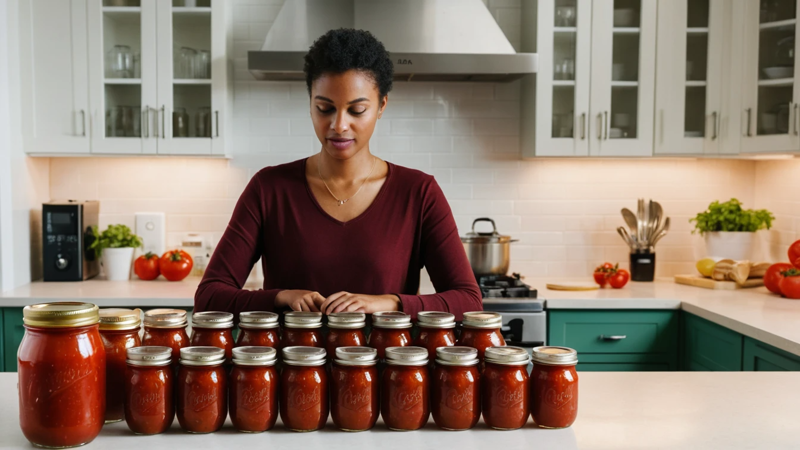
Marinara sauce recalls explained — learn why sauces are pulled, how to check your pantry, and stay safe with your favorite meals.
Marinara sauce recalls happen when jarred or prepared tomato sauces are found to have undeclared allergens, contamination, foreign material, or processing flaws. Knowing how to identify recalled batches and what to do keeps your kitchen safe.
Marinara Sauce Recalls: What You Need to Know 🍝
Have you ever grabbed a jar of marinara sauce and wondered if it’s really safe? It’s surprising, but even something as basic as your pasta sauce can trigger a recall. Let’s dive into what’s going on—and how you can protect yourself.
Understanding The Search Intent
The keyword “marinara sauce recalls” shows readers want:
- Real examples of recalls.
- Reasons why recalls happen (allergens, contamination, mislabeling).
- How to check products at home.
- What to do if you own a recalled jar.
- How to avoid future risks.
Let’s cover all of that in simple, clear language. 😊
Why Jarred Marinara Sauce Gets Recalled
Jarred sauces might seem low-risk, but they face many hazards:
- Undeclared allergens like tree nuts, milk, or shellfish.
- Contamination such as mold, yeast, or bacteria.
- Foreign material or packaging defects, like bits of glass or plastic.
- Labeling errors, where ingredients or allergens aren’t listed correctly.
- Under-processing, which causes spoilage or bulging jars.
Each of these issues can lead to a recall. And for people with allergies or sensitivities, this can be dangerous.
A Brief Timeline: Notable Marinara Recalls
Here’s a look at recent recalls that made headlines:
| Year | Brand/Product | Issue | Scope |
| 2019 | Victoria Marinara (40 oz) | Undeclared tree-nut allergen (cashew). | Around 1,200 cases nationwide. |
| 2021 | Mid’s Marinara | Incorrect potassium labeling. | 160,000 jars recalled. |
| 2023 | Scratch Pasta Co. Marinara | Undeclared milk allergen (butter). | 1,800 jars in Virginia. |
| 2024 | Hudson Harvest Tomato Basil Sauce | Under-processing, bulging jars. | Regional recall in the Northeast. |
Recalls happen more often than people think—and not just with small brands.
How To Check If You Have A Recalled Marinara Sauce
Got a jar of marinara in your pantry? Here’s what to do:
- Read the label. Find the batch or lot code and the “best by” date.
- Compare with recall announcements. Retailers and brands post these online or in-store.
- Inspect the jar. Bulging lids, leaks, or cracks are warning signs.
- Smell and look. If it smells sour or looks discolored, toss it.
- Contact the manufacturer if you’re unsure. Most have hotlines for consumer questions.
What To Do If Your Marinara Sauce Is Recalled
If you learn your sauce is affected:
- Stop using it immediately.
- Return it to the store for a refund if allowed.
- Throw it away safely if you can’t return it. Seal it in a bag before disposal.
- Watch for symptoms if you’ve already eaten it—especially if you’re allergic or pregnant.
- Save the receipt and jar label in case you need to file a report.
Who Is At Highest Risk?
While anyone can get sick, certain groups face higher danger:
- People with food allergies. Even tiny traces of nuts or dairy can trigger severe reactions.
- Pregnant women. Some bacteria found in contaminated food can harm the baby.
- Older adults and those with weak immune systems. They’re more prone to severe foodborne illness.
- People with chronic diseases. For example, those with kidney issues are sensitive to excess potassium.
If you’re in one of these groups, extra caution goes a long way.
Why Homemade Marinara Has Less Recall Risk
Homemade sauce gives you total control:
- You choose safe, fresh ingredients.
- You can avoid allergens and preservatives.
- You control storage and labeling at home.
Still, homemade sauces can spoil if not stored properly. Always cool, refrigerate, or freeze your sauce promptly and label the date.
How Brands and Regulators Manage Recalls
Here’s how the recall process works:
- Manufacturers monitor production and issue recalls if something goes wrong.
- Regulators like the FDA or USDA oversee food safety and classify recall severity.
- Retailers remove affected batches from shelves and alert customers.
- Consumers check and discard affected products.
This system helps prevent widespread harm—but only if shoppers stay informed.
What To Look For In A Safe Marinara Sauce
Next time you shop, use these quick checks:
- Clear labeling: Ingredients and allergens listed clearly.
- Batch codes: Easy to find and verify.
- Packaging integrity: Lids should be flat and sealed tight.
- Storage info: “Refrigerate after opening” should be printed clearly.
- Brand transparency: Companies with strong recall responses are usually more trustworthy.
- Simple ingredients: Fewer additives can mean fewer risks.
Smart shopping is your best defense.
Common Misconceptions About Marinara Sauce Recalls
Let’s bust some myths:
- “Tomato sauce can’t make you sick.” Yes, it can—especially if contaminated.
- “If I ate it already and feel fine, I’m safe.” Not always. Some effects take time.
- “Organic brands don’t get recalled.” Even organic or gourmet brands can have labeling errors.
- “Recalls only affect big stores.” Smaller brands and local producers have recalls too.
Awareness, not fear, is the goal.
How To Store Jarred Sauce Properly 🧊
Proper storage keeps your sauce fresh and safe:
- Keep unopened jars in a cool, dry place away from sunlight.
- Refrigerate after opening and use within 5–7 days.
- Freeze leftovers if you won’t use them soon. Leave room in the container for expansion.
- Never eat from bulging jars—it’s a sign of gas from bacterial growth.
- Avoid reheating repeatedly. Each time you heat and cool food, bacteria have a chance to grow.
Proper handling prevents spoilage and health issues.
A Consumer Checklist: What You Should Do Right Now
Here’s a 5-minute pantry check to protect yourself:
- Gather all marinara or pasta sauces.
- Look for batch codes and expiration dates.
- Search for recent recall notices on brand sites or news outlets.
- Discard or return affected products.
- Label remaining jars with the purchase date to track freshness.
A little effort today can save a lot of stress later. 💪
Why Staying Updated On Recalls Matters
Food recalls aren’t rare—they happen every month. Here’s why staying informed helps:
- You protect your family’s health.
- You save money by avoiding products that could make you sick.
- You encourage accountability—companies take recalls seriously when consumers stay alert.
- You prevent future problems by learning how to store and shop smarter.
Knowledge really is your best ingredient.
From This Point On: Smart Sauce Shopping
Moving forward, be a mindful shopper:
- Pick trusted brands with transparent labeling.
- Check recall histories periodically.
- Sign up for email alerts from your grocery store or the FDA.
- Scan product barcodes with recall-tracking apps if available.
- When in doubt, toss it out—your health matters more than a $4 jar.
You deserve peace of mind every time you cook pasta.
Quick Comparison Of Store-Bought vs. Homemade Safety
| Factor | Store-Bought Sauce | Homemade Sauce |
| Ingredients Control | Limited | Full control |
| Allergen Risk | Possible mislabeling | Minimal if homemade |
| Shelf Life | Long (due to preservatives) | Shorter, depends on storage |
| Recall Risk | Moderate | Low |
| Cost Per Jar | $3–$8 | $1–$4 depending on ingredients |
Homemade wins for control and safety—store-bought wins for convenience.
Final Thoughts
The next time you reach for your favorite jar of marinara, remember this: even the most trusted brands can face recalls. Stay informed, check labels, and don’t ignore packaging warning signs. A little awareness ensures every pasta night stays safe, stress-free, and delicious. 🍅
FAQs
How can I tell if my marinara sauce has been recalled?
Check the brand’s website or recall announcements and compare the batch or lot number on your jar. If it matches, stop using it immediately.
What should I do if I ate recalled sauce?
If you’ve eaten recalled sauce, don’t panic—just watch for symptoms like nausea or allergic reactions. Contact your healthcare provider if anything feels off.
Are homemade marinara sauces safer than store-bought?
Homemade sauces let you control ingredients and avoid labeling errors, but proper canning or refrigeration is still essential for safety.
Which allergens cause the most marinara recalls?
Common culprits include milk, nuts, and soy due to cross-contamination or undeclared ingredients during production.
Can unopened marinara sauce go bad?
Yes—if stored in a hot place or if the seal breaks, bacteria can grow. Always check that the lid isn’t bulging or leaking before opening.


